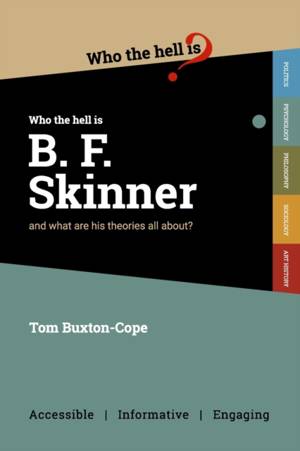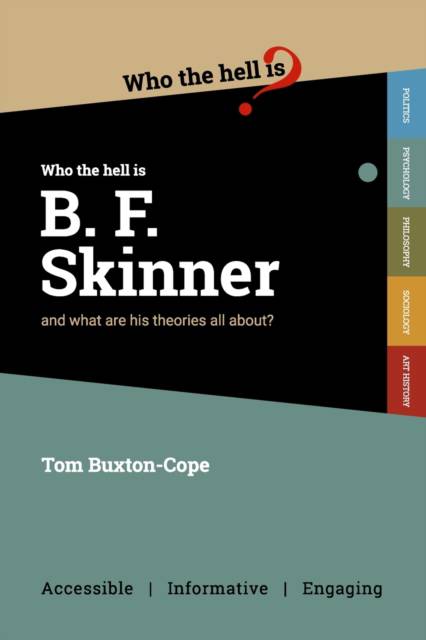
- Afhalen na 1 uur in een winkel met voorraad
- Gratis thuislevering in België vanaf € 30
- Ruim aanbod met 7 miljoen producten
- Afhalen na 1 uur in een winkel met voorraad
- Gratis thuislevering in België vanaf € 30
- Ruim aanbod met 7 miljoen producten
Omschrijving
For students, teachers and curious minds, our carefully structured jargon-free series helps you really get to grips with brilliant intellectuals and their inherently complex theories. Written in an accessible and engaging way, each book takes you through the life and influences of these great thinkers, then takes a deep dive into three of their key theories in plain English. Smart thinking made easy!
Who the Hell is B.F. Skinner? looks at the life and works of this highly influential American psychologist, behaviourist, social philosopher and inventor. A pioneer of modern behaviourism, Skinner founded a school of experimental research psychology and his work on behavioural conditioning altered the course of psychology and psychotherapy. Here we find out who this ingenious man really was, the influences on his thinking, and how he developed his groundbreaking ideas on operant conditioning and radical behaviourism.
Reviews
"BF Skinner was one of the best known and most controversial psychologists of his age and beyond. Who the Hell is B.F. Skinner? is an outstanding biography of the man and his theories, and is a must read for anybody interested in the history of psychology and its iconic theorists. It is well written, very informative and makes a significant contribution to the field of psychology."
Professor Sir Cary Cooper, ALLIANCE Manchester Business School, University of Manchester
"This book advertises itself as 'accessible', 'informative' and 'engaging' and it ticked all three boxes right from the very start. I wasn't sure what to expect from this text, but from the first page I was hooked and it didn't take me long to devour the first half with ease. The first chapter 'Skinner's Life Story' is absolutely fascinating and I'm embarrassed to admit I knew very little about him as a person and more so as a psychologist. This chapter delivers so much information and the links between some of his childhood experiences and his later well-known experiments are clearly evident. I got to know Skinner, or Fred as he was known to his friends and family. The chapter explores his relationships with his parents, brother, various friendships, teachers and gives insight into how his childhood influenced some of his later work. Chapters 2 and 3 cover influences on Skinner's thinking and operant conditioning, both equally engaging. However, I was most captivated by chapter 4 'Applications of Skinner's Work' which outlines some of his innovative creations. These included the Aircrib (a baby cot, of sorts) and his Teaching Machines, both inspired by his daughters. The final chapter 'Radical Behaviourism' is a little heavier as it discusses the differences between Watson's 'methodological behaviourism' and Skinner's radical behaviourism, misconceptions of radical behaviourism and links between Skinner and Darwin.
Who is this relevant for? I'd say anyone interested in psychology. It references so many well-known points in history (and many personal ones for Skinner) which have influenced his life and work, from the early death of his younger brother, 'Project Pigeon', the influences of Watson & Rayner and Pavlov, World War II and his many publications on reinforcement and behaviourism. As an A level psychology student I would have loved it; it really is accessible and I shall be recommending it on the New Year reading list for our Year 12 and 13 students. I already have a short list of students I plan to offer it to on loan (with the obligatory quarantining of course!). If your department budget or school/college library can stretch to it then it's a worthwhile investment."
Laura Quaife Association for the Teaching of Psychology magazine, Feb 2021
Specificaties
Betrokkenen
- Auteur(s):
- Uitgeverij:
Inhoud
- Aantal bladzijden:
- 128
- Taal:
- Engels
- Reeks:
Eigenschappen
- Productcode (EAN):
- 9781999949280
- Verschijningsdatum:
- 21/10/2020
- Uitvoering:
- Paperback
- Formaat:
- Trade paperback (VS)
- Afmetingen:
- 152 mm x 229 mm
- Gewicht:
- 199 g

Alleen bij Standaard Boekhandel
Beoordelingen
We publiceren alleen reviews die voldoen aan de voorwaarden voor reviews. Bekijk onze voorwaarden voor reviews.











